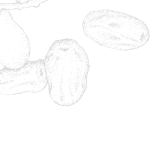Figs and dates are two of the oldest cultivated fruits in the world, prized for their natural sweetness, rich nutrients, and versatility in cooking. While they share some similarities, they also have distinct differences in taste, texture, and health benefits. Whether you’re choosing between them for a snack, a recipe, or their nutritional value, understanding their differences can help you make the best choice.
Origin and Appearance
- Figs come from the Ficus carica tree and are native to the Middle East and Mediterranean regions. They have a soft, chewy texture with tiny edible seeds inside. Fresh figs are delicate and perishable, while dried figs have a more concentrated sweetness.
- Dates grow on the date palm and are primarily cultivated in the Middle East, North Africa, and California. They have a sticky, caramel-like texture with a single pit inside. Dates are commonly sold dried, giving them a long shelf life.
Taste and Texture
- Figs have a mildly sweet, honey-like flavor with a slightly grainy texture due to their seeds. Dried figs are chewier and more intense in sweetness.
- Dates are much sweeter, with a rich, caramel-like taste and a sticky, dense texture. Medjool dates, in particular, are known for their softness and deep sweetness.
Nutritional Comparison (Per 100g, Dried)
| Nutrient | Figs (Dried) | Dates |
|---|---|---|
| Calories | 249 kcal | 277 kcal |
| Carbs | 63.9g | 75g |
| Fiber | 9.8g | 6.7g |
| Sugar | 47.9g | 66g |
| Calcium | 162mg | 64mg |
| Potassium | 680mg | 696mg |
| Magnesium | 68mg | 54mg |
| Iron | 2mg | 0.9mg |
Key Nutritional Differences
- Figs contain more fiber, calcium, and iron, making them great for digestion and bone health.
- Dates are higher in sugar and calories, providing quick energy, but may not be ideal for those watching their sugar intake.
- Both are rich in potassium, which supports heart health.
Health Benefits
Figs:
- Improve digestion (high fiber content).
- Support bone health (rich in calcium).
- Contain antioxidants that fight inflammation.
Dates:
- Provide instant energy (high natural sugar content).
- May support brain health (contains B vitamins).
- Help regulate blood pressure (good potassium source).
Culinary Uses
- Figs work well in salads, jams, desserts, and cheese pairings. They can also be used in savory dishes like roasted meats.
- Dates are often eaten as a snack, stuffed with nuts, blended into smoothies, or used in energy bars and desserts like sticky date pudding.
Which One Should You Choose?
- Choose figs if you want a less sweet, fiber-rich option with more minerals.
- Opt for dates if you need quick energy or prefer a caramel-like sweetness in recipes.
Both fruits are nutritious and delicious, so including both in your diet can offer a variety of health benefits and flavors!
Would you like a recipe comparison or more details on specific health benefits? Let us know how we can expand!

